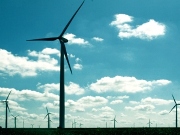“With the start of construction of Garob, we have reached yet another important milestone in South Africa just weeks after breaking ground at the Oyster Bay wind project,” said Antonio Cammisecra, Head of Enel Green Power. “Alongside boosting renewables growth in South Africa, we are focusing our sustainability activities on scientific education, which significantly contributes to the skills needed for power industry professionals, with a view to support local expertise. Looking ahead, we will continue to break ground on the projects we were awarded in South Africa and to launch shared value initiatives for local communities, while scouting for further sustainable growth opportunities in the country’s renewable industry.”
Garob is the third renewable project Enel Green Power has started building in South Africa since the beginning of this year, in line with its investment programme in the country. The other projects are the Nxuba and Oyster Bay wind farms, of 140 MW each, for a total capacity of 420 MW under construction in South Africa.
Once fully operational, due by the first half of 2021, the 46-turbine Garob wind farm is expected to generate around 573 GWh per year, avoiding the annual emission of around 600,000 tons of CO2 into the atmosphere. The Garob project was awarded to EGP RSA during the fourth bidding window under the Renewable Energy Independent Power Producer Procurement Programme (REIPPPP).
The Garob wind farm, which is the Group’s first wind project under construction in the Northern Cape province, is situated in an area fast becoming a renewable energy hub in South Africa due to the growing number of both solar and wind farms in the region. Concrete towers will be built on-site at Garob, instead of pre-fabricated steel towers, improving local employment during the construction phase.
Enel Green Power will launch Enterprise Development (ED) initiatives in the communities living in the proximity of the wind farm once Garob is operational, such as the Herbal Lean Incubation Programme, which provides mentoring and support services to start-ups in the agro, bio and food technology field.
Sustainability projects that Enel Green Power implemented in the Northern Cape include the installation of an artificial turf football field that captures and stores rainwater. A water purification facility is used to clean the rainwater, addressing water shortages and providing clean drinking water. Other initiatives include free Wi-Fi to local communities, in an effort to support public authorities’ plans to roll out free Wi-Fi networks in under-served communities.
In the fourth round of REIPPPP, Enel Green Power won a total of five wind projects for around 700 MW. Other projects awarded to the company in round four were the 140 MW Karusa and the 140 MW Soetwater wind plants, also located in the Northern Cape province, as well as the previously mentioned Nxuba and Oyster Bay, which are both located in the Eastern Cape province. Enel Green Power already has more than 520 MW in wind and solar plants in operation in South Africa. The company’s fully operational solar plants are the 10 MW Upington and the 82.5 MW Adams in the Northern Cape province, the 82.5 MW Pulida in the Free State province, the 66 MW Tom Burke in Limpopo, and the 82.5 MW Paleishuewel in the Western Cape. The group’s operational South African wind farms are the 88 MW Nojoli and the 111 MW Gibson Bay, both in the Eastern Cape.
17 Февраля 2026 | вторник | 13:17


